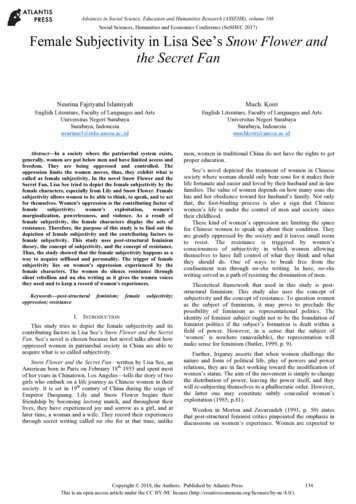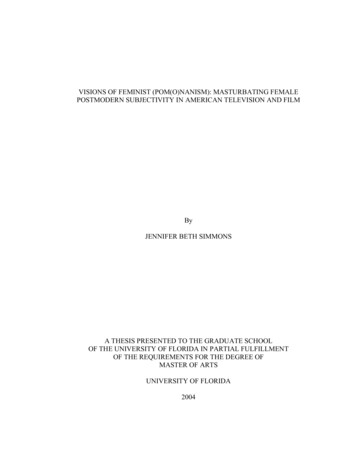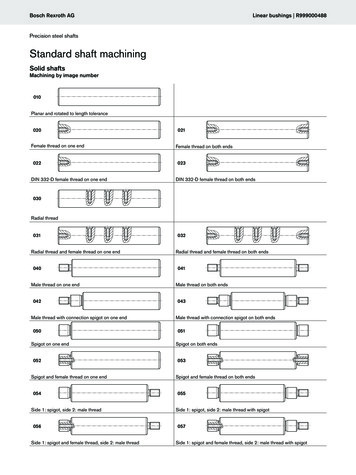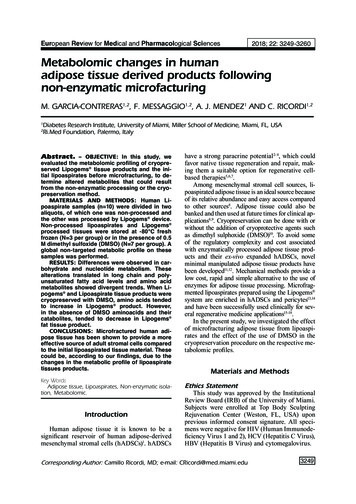
Transcription
Advances in Social Science, Education and Humanities Research (ASSEHR), volume 108Social Sciences, Humanities and Economics Conference (SoSHEC 2017)Female Subjectivity in Lisa See’s Snow Flower andthe Secret FanNeurina Fajriyatul IslamiyahMuch. KoiriEnglish Literature, Faculty of Languages and ArtsUniversitas Negeri SurabayaSurabaya, Indonesianeurinai1@mhs.unesa.ac,.idEnglish Literature, Faculty of Languages and ArtsUniversitas Negeri SurabayaSurabaya, Indonesiamuchkoiri@unesa.ac.idAbstract—In a society where the patriarchal system exists,generally, women are put below men and have limited access andfreedom. They are being oppressed and controlled. Theoppression limits the women moves, thus, they exhibit what iscalled as female subjectivity. In the novel Snow Flower and theSecret Fan, Lisa See tried to depict the female subjectivity by thefemale characters, especially from Lily and Snow Flower. Femalesubjectivity allows women to be able to think, to speak, and to actfor themselves. Women's oppression is the contributing factor rginalization, powerlessness, and violence. As a result offemale subjectivity, the female characters display the acts ofresistance. Therefore, the purpose of this study is to find out thedepiction of female subjectivity and the contributing factors tofemale subjectivity. This study uses post-structural feminismtheory, the concept of subjectivity, and the concept of resistance.Thus, the study showed that the female subjectivity happens as away to acquire selfhood and personality. The trigger of femalesubjectivity lies on women's oppression experienced by thefemale characters. The women do silence resistance throughsilent rebellion and nu shu writing as it gives the women voicesthey need and to keep a record of women's experiences.Keywords—post-structuraloppression; resistancefeminism;femalesubjectivity;I. INTRODUCTIONThis study tries to depict the female subjectivity and itscontributing factors in Lisa See’s Snow Flower and the SecretFan. See’s novel is chosen because her novel talks about howoppressed women in patriarchal society in China are able toacquire what is so called subjectivity.Snow Flower and the Secret Fan—written by Lisa See, anAmerican born in Paris on February 18th 1955 and spent mostof her years in Chinatown, Los Angeles—tells the story of twogirls who embark on a life journey as Chinese women in theirsociety. It is set in 19th century of China during the reign ofEmperor Daoguang. Lily and Snow Flower begins theirfriendship by becoming laotong match, and throughout theirlives, they have experienced joy and sorrow as a girl, and atlater time, a woman and a wife. They record their experiencesthrough secret writing called nu shu for at that time, unlikemen, women in traditional China do not have the rights to getproper education.See’s novel depicted the treatment of women in Chinesesociety where woman should only bear sons for it makes theirlife fortunate and easier and loved by their husband and in-lawfamilies. The value of women depends on how many sons shehas and her obedience toward her husband’s family. Not onlythat, the foot-binding process is also a sign that Chinesewomen’s life is under the control of men and society sincetheir childhood.These kind of women’s oppression are limiting the spacefor Chinese women to speak up about their condition. Theyare greatly oppressed by the society and it leaves small roomto resist. The resistance is triggered by women’sconsciousness of subjectivity in which women allowingthemselves to have full control of what they think and whatthey should do. One of ways to break free from theconfinement was through nu-shu writing. In here, nu-shuwriting served as a path of resisting the domination of men.Theoretical framework that used in this study is poststructural feminism. This study also uses the concept ofsubjectivity and the concept of resistance. To question womenas the subject of feminism, it may prove to preclude thepossibility of feminism as representational politics. Theidentity of feminist subject ought not to be the foundation offeminist politics if the subject’s formation is dealt within afield of power. However, in a sense that the subject of‘women’ is nowhere (unavailable), the representation willmake sense for feminism (Butler, 1999, p. 9).Further, Irigaray asserts that when women challenge thenature and form of political life, play of powers and powerrelations, they are in fact working toward the modification ofwomen’s status. The aim of the movement is simply to changethe distribution of power, leaving the power itself, and theywill re-subjecting themselves to a phallocratic order. However,the latter one may constitute subtly concealed women’sexploitation (1985, p.81).Weedon in Morton and Zavarzadeh (1991, p. 50) statesthat post-structural feminist critics pinpointed the emphasis indiscussions on women’s experience. Women are expected toCopyright 2018, the Authors. Published by Atlantis Press.This is an open access article under the CC BY-NC license 34
Advances in Social Science, Education and Humanities Research (ASSEHR), volume 108raise consciousness by talking with other women aboutexperiences, recognizing similarities and looking for the socialcauses. Feminists moves to extend politics from outside intodomesticity and the realm personal relationship. Early feministmovements believe that expressing women’s experience is away of speaking the unvoiced or suppressed reality of what isit to be a woman. This point of view relies on experience andthe language in which it is expressed.Mansfield (2000, p. 6) proposes that subjectivity isprimarily an experience, and remains permanently open toinconsistency, contradiction and unself-consciousness. Whichmeans that every single experience remains forever toourselves due to dogma or norm in a society that can makeone single thing becomes homogenized. Subjectivity offers tosee the world based solely on our own experiences and as away to represents self-recognition which sometimespleasurable and reassuring, but never being the final restingplace. According to post-structuralism, subjectivity isconstantly negotiated, constituted, and reconstituted indiscourse every time an individual thinks or speaks (Soza,2014, p. 13).Any kind of resistance is a form of unwillingness towardsthe advocated, or inculcated, repertoire (Even-Zohar, 2002, p.48). People who are oppressed and dominated will likelyperform the act of resistance for they think and feel that theparticular condition is not fair to them. From here, theintention of doing resistance and shall the resistance be visibleand recognized marks the discussion span of resistance.Resistance’s recognition depends on the goal of the resisters.Some do it to get recognition, while other conceal itintentionally (Hollander and Einwohner, 2004, p. 540).There is also a concept of ‘everyday resistance’ that wasfirst introduced by James Scott in 1985. It is the way peopleact in their everyday lives and the resistance is not easilyrecognized like demonstration. But it is quite, disguised, andseemingly invisible. Such resistance is done routinely andoften not being recognized by society (Vinthagen andJohansson, 2013, pp. 2-4, 10).This study also looks at women’s condition in China in19th century. The background of socio-economic as well as theculture and tradition which present in ancient China will assistthis study to asses and to analyze the female subjectivity asexperienced by Lily and Snow Flower in Lisa See’s SnowFlower and the Secret Fan. It will look into how Chinesesociety defines the role of women. This background of womenin Chinese society also serves as the ground basis to examinethe resistance done by Lily and Snow Flower as a result oftheir female subjectivity.In China, Confucius teaching had not favorable word forwomen. As cited by David and Vera Mace in Man Rhim(1982, p. 1), Confucius teaching is based on patriarchalsystem, filial piety, and ancestor worship. In this system,woman had to obey and not to question anything. Throughouther life, woman needs to obey her father when she is adaughter, when married she obeys husband, and whenwidowed obeys her son. The idea of traditional Chinesecosmology where male is sees as having positive energy andfemale represents negative energy and aura is reinforcing theConfucius teaching.The situation of the illustration above suggests that Chinawas or perhaps still is a male-centered society. The differentialtreatment of men and women had been present over thecenturies and it looks like women are often, if not always,being overlooked. This clearly gives the fact that women hadalways been possessed and dominated throughout their livesby men.II. METHODResearch method used in this study is post-structuralfeminism applied into the elements of feminism which arepresented in Snow Flower and the Secret Fan. The data sourceis the novel entitled Snow Flower and the Secret Fan writtenby Lisa See and was published in 2005 by Random HouseNew York. The data are in the form of direct/indirectquotations, phrases, and dialogues.To obtain the data, closereading will be done to analyze and to classify the data neededin the form of the quotations and/or statements which arepresent in the novel.This study has several analytical steps. First, close readingon Lisa See’s Snow Flower and the Secret Fan is done toclassify and deal with the text. Second, data is classified basedon the statement problem. They are to reveal the depiction offemale subjectivity happened to Lily and Snow Flower and toreveal the contributing factors of female subjectivity. Third,using post-structural feminism as the theoretical frameworkand the concept of subjectivity to depict the femalesubjectivity. Fourth is revealing the contributing factors tofemale subjectivity. Here the concept of resistance will beused to justify why female subjectivity happens. Fifth isanswering the statement problems and draw the conclusion.III. DISCUSSIONA. Depiction of Female SubjectivityThe first problem is about female subjectivity. In here thedepiction of female subjectivity includes the behavior, thethought, the action, and the spoken matters done by the femalecharacters.All of Third Sister’s screams of the past weeks took on adifferent meaning. Did she know on that first day thatsomething bad might happen? Was that why she hadresisted? Had Mama made some terrible mistake in herhaste? Had Third Sister’s blood poisoning been triggeredby wrinkles in her bindings? Was she weak from badnutrition as Madame Wang claimed I had been? Whathad she done in her previous life to deserve thispunishment now? (See, 2005, pp. 31-32)In the past time, Chinese girls during certain age are boundto have their feet bounded. As a symbol and hope of attractinghappy marriage and prosperous life, Lily’s family, especiallymother and aunt, decides to do the foot-binding ritual for threegirls on the house, Lily, Third Sister, and Beautiful Moon.However, as they are poor and uneducated women, little didthe mother know that the process could fatally damage the feetof the children, even the slightest mistake on the process could135
Advances in Social Science, Education and Humanities Research (ASSEHR), volume 108lead to death. All that matters to them is do the bindingcorrectly to attain perfect size of feet so that their daughters’future are reassured.Lily, who has learnt that she would later, becomes awoman of influence, accepts the reality and endures the pain.She hopes that she will be rewarded exactly as she is told. Shedoes not complain nor protest. When mother orders her tocross the room back and forth to make the toes brokenquickly, she just quietly does as she says. It is different fromThird Sister. She insists that she won’t bind her feet, butmother cusses at her and treats her harder and harsher. Shecries and screams everyday but no one took pity in her untilher legs getting red streak and she is down with high fever.Deep down, Lily already has her suspicion that from thebeginning, perhaps, Third Sister already knows something badmight happen during the foot-binding process. When she said‘Had Mama made some terrible mistake in her haste?’, it isclear that she thinks of her mother’s doing as the trigger of thecalamity. Although she is not supposed to say what she thinksout loud, she questions the harsh acts of her which results inThird Sister’s suffering. She also mentions ‘wrinkles in herbinding’ which indicates that the binding is loose and not doneproperly. If it is tight and proper, such thing as bloodpoisoning is impossible to begin with. In here, Lily seems tocondemn the mother of her wrongdoing.Having grown up in an environment that forbid women tobecome talkative and critical, Lily have accustomed hearingthings like ‘women are useless creature’ or ‘women’s worthare depending on their sons’. Eventually, she internalizes thevalues into herself. Besides those thing, she is also able toexamine the situation of her surrounding and carefully pickingup the valuable lessons or simply takes the good manners to beimplemented later on in her life. She is a kid, but her mindalready matured like a woman. She is just a little daughter, buther eyes already envisioned her future far from the presenttime.The story showed me how the value of a girl-or womancould shift from person to person. It also offeredpractical instruction on how to care for a loved one afterdeath-how a body should be handled, what constitutedproper eternity garments, where someone should beburied. My family had tried their best to follow theserules, and I would too, once I became a wife and mother.(See, 2015, p. 39)One time when the women of the family gather together,aunt and her sworn sisters are reciting and old tale of “TheStory of the Woman with Three Brothers”. Lily, despitehearing the tale for many times, still love listening to the story.It reminds her of the death of Third Sister and grandmother.Being a woman in Chinese society is not easy. The sentence of‘the value of a girl-or woman-could shift from person toperson’ means that girl or woman is seen differently in thesociety, or in the family, to be exact. The hidden moral is thatno matter how the relationship works within the family, whenone dies, the others should take good care of it.There are three main points to do to become a filial child.First is caring for families, second is to present proper garmentfor the dead, and third is to bury the dead in the righteousplace. Although this seems easy, according to Lily’s familycircumstances, to do the last two is the most difficult one.They are a poor family, and given two death situation, Baba,as the head of the family, needs to sort things out in regard ofthe funeral procession. Lily witnesses all the happenings, andshe learns that her family had done their best to accommodatethe tradition.Madame Wang, the matchmaker, proposes to Lily’s familyto find a laotong match for Lily. Laotong match is a matchbetween two girls that bound them to love each other untildeath. Its bond is stronger than marriage and couldn’t tearapart. Basically, laotong match is examined through thesameness of name characters, birth month, Chinese zodiac,and the family circumstances. Laotong match is supposed tosupport and comfort, and to learn the differences of thepartner’s ways of life in order to see life wisely.Women who talk a lot and express their minds freely isconsidered as a troublesome one. Snow Flower is talkative,whereas Lily is quiet. Knowing that Lily is quiet, SnowFlower takes the chance to tell her that she is okay with herbeing quiet. ‘I don’t care if you’re quiet’ indicates that SnowFlower does not mind seeing Lily spoke only little. It can alsomean that she likes Lily for it. As a girl who loved talking,what Snow Flower needs is ears to listen without asking orquestioning much. And perhaps, Lily fits into the criteria soSnow Flower grows intimate companion and being fond toher. Another thing to note is that when Snow Flower speaksthat she get troubles of her talking, this indicates that girls orwomen in that era have the limited space to speak up theirminds. The society constructs women as the second role, itmeans that women are not allowed to display some sort ofinterest outside their inner realm.‘I often don’t think before I speak’ shows that SnowFlower has the spontaneous ability to just speak withoutconsidering the consequences that may happen because of herwords. She is not afraid of anything, she embraces hercuriosity proudly and even admits that she had taken intoproblem. Snow Flower is a strong girl for her age. She clearlydisplays her bravery and made remarks that this is what she is;talkative, curious, and risk taker.Meanwhile, she expresses her thought of Lily becoming anideal wife just based on the words choice. For her, Lily mightbe the best ideal wife because she is meek and docile. Theideal wife is those who do not speak a lot. Although it doesfeel ambiguous, Snow Flower is kind of expressing thethought that she may not be an ideal wife herself. She mightquestion a lot of things and in opposite, Lily would be just doanything as she told to. She just thought that she probablywon’t fit into the criteria which constituted the ideal of a wife.Sitting in the upstairs chamber, I planned and schemed,but I was scared. Simplicity seemed best--I would pickup Snow Flower in my palanquin on my way home--butit would also be the easiest way to get caught. butby the time the festival arrived, I had built up my braveryto the point I thought we might succeed. (See, 2005, pp.160-161)136
Advances in Social Science, Education and Humanities Research (ASSEHR), volume 108Lily thinks of a plan to meet Snow Flower secretly. Shehas to do it without the knowledge of mother in law. Sheneeds to execute the plan carefully or she will face big trouble.This act remarks her bravery to do thing for herself. Althoughshe knows the risk, she still boldly take the action. In here, Seeexpresses how Lily has her own authority to react to theproblem. She is being independent and does not rely to othersto look for an answer.the victim than seeing her kids dying. Motherly instinct takesover the way she thinks. She uses all her strength to think ofthe best way to stay alive.She tries to experimenting the plan to see whether it willwork well or not. If it is, she will probably do the same thinglater on when she wants to meet Snow Flower. The mother inlaw’s reason to forbid Lily meeting Snow Flower is to preventSnow Flower’s presence to influence her grandson. Sheclearly sees Snow Flower as an unworthy person to be withher daughter in law. Judging someone because of their lack ofstatus is considered as an act of marginalization. Lily does notwant to marginalize her laotong just because she is a poor.Thus, she tries to escape from what mother in law says aboutSnow Flower and rebels through this way.During her married life, Lily never disobeys what hermother in law says. However, this time, she does differently.For the very first time, she does not listen to her mother in lawfor the sake of her children’s health condition. She stands forwhat she believes is the right thing to do. Her brave act showsthat even though she is still subjected to serve her in laws andfamily, she does not abandon her children. She puts herchildren before her and implies that if something bad happensto her children, it is more likely that she won’t forgive herself.Her not answering in law’s question means that she has adifferent idea and approach to tend the kids. It can also beinferred that she cannot trust and believe other people morethan her own. She exhibits a strategy of surviving.She laughed into the darkness. “No one gets sick frombed business. It only gives you pleasure. I work hard allday for mother in law. Do I not deserve the delights ofnight? And, if I have another son, I will be happier still.”(See, 2005, p. 164)In this case Snow Flower expresses her opinion of intimatemoment between husband and wife. It is taboo to speak of it,but Snow Flower does not see that as a wrong thing to do. Byspeaking of her mind, she delivers the idea of her intimatemoment and why she likes that. She admits she enjoys doingbed business because it gives her pleasure and as a chance tobreak away from reality for a little while.When she says ‘Do I not deserve the delights of night?”,she questions whether it is not okay to talk very openly aboutthe intimate relation. In front of Lily, she is able to pour outher thoughts freely since she knew Lily will listen to her.Snow Flower is all alone in the husband’s house, no one talksto her, no one shares stories with her, and most importantly,no one listens to her grudges. Their laotong relationshipallows them to talk about everything, even the most privatetalk.“Only I will leave this room,” I told my children. “ElderBrother is in charge of you when I am not here. You areto obey him in all ways. (See, 2005, p. 177)The drought comes in Tongkou makes the crops cannot beharvested. To make thing worse, the typhoid outbreak pinsdown people and death come along with it. Lily’s husbandgone to Guilin to buy salt, leaving Lily alone at the house.Without husband, Lily feels anxious, restless, unprotected andpowerless. She needs to do everything to protect her childrenat all cost. Lily knew the situation in the household is reallybad, but she cannot abandon her duty as daughter in law. Shehas to put aside her fear and runs the house.Lily could not care less about what happens to the other inlaws as they all locked themselves up in their rooms. Theoutbreak is terrifying and Lily knows it is only a matter oftime to see one of them succumbs to the deadly disease. Shewon’t let the typhoid affects her children. She would rather beI stared at the chicken. My mouth salivated and mystomach grumbled, but for the first time in my marriedlife I turned a deaf ear. I did not answer. (See, 2005, p.178)B. Contributing Factors to Female SubjectivityThere must be factors triggering the women to awakentheir subjectivity. In the novel it is mainly because of women’soppression. Young in Heldke and O’Connor (2003, pp. 37-60)stated that there are five types of oppression; exploitation,marginalization, powerlessness, cultural imperialism, andviolence. Yet, there are four types of women’s oppression thatcan be seen in the novel.Women’s ExploitationThere are two notable matters in the novel which manifestthe women’s exploitation. The first one is women’s laborinside and/or outside the house, the second one is sexualexploitation. It has been known all along that even though awoman works to support her family to earn some money, still,she is expected to do houseworks too. Men expect women tobe able to perform both duties as working women and housewife and demand perfection.In the novel, Lily married to a noble family in which shewas not allowed to do work outside home. Her works wasonly around serving his husband or obeying her in-laws. Hermain labor was to take care of the household and to learn howto be the proper lady.“ You know how to spin cotton and wool, weave, sew,and embroider. You know how to cook, clean, wash, keeptea always warm and ready, and light the fire in thehearth ” (See, 2005, p. 109).Houseworks for women is considered really important,especially when a daughter marries and has to move to thehusband’s house. The quotation above is stated by Lily’smother, day before her marriage. “Cook, clean, wash, keep teaready, light the fire” are all works that generally done bywomen in a household. Women are expected to master the artof becoming the queen of the kitchen. In this case women are137
Advances in Social Science, Education and Humanities Research (ASSEHR), volume 108exploited to do the house chores and of course to masterwomen’s craft such as embroidery. By doing all the housechores, it shows that women are embodied as the ‘servant’ ofthe house and it highlights the view of traditional gender roleof women.mostly guaranteed. The feet symbolizes the intimate part of amen, thus, men find it attractive to have women with feetbounded. Thus, the practice of foot-binding is degradingwomen for women are just object of men’s pleasure in thesociety.Women’s MarginalizationViolenceBoth Lily and Snow Flower are marginalized since theirchildhood. As daughters, they are treated as ‘worthless child’and do not have the right to join the activities of men. At theirhome, there is room only for women and men are not allowedto enter. In the room, women can speak freely and did thingslike embroidery or telling stories to other girls/women.In the novel, only Snow Flower experiences violence,sexual violence and physical abuse. During her married life,she often gets beaten by her husband. She receives physicalabuse even though she does nothing wrong. All of the beatenis mostly triggered by Snow Flower’s failure to conceive ason, or that she gives birth to a daughter. Snow Flower’shusband was a temperamental man. He would easily beat herand acted as if nothing happened afterwards. Lily witnessedhis brutality when Snow Flower’s second son died all of asudden.My family home was typical in the sense that it had twostories and faced south. A room upstairs was designatedfor women’s gathering and for unmarried girls to sleep.(See, 2005, p. 9)The different treatments between men and women isreflected in the novel through the description of separatedrooms of men and women, as seen in the quotation above.That typical women’s chamber does exist in every house, be itrich household or household of farmers. This separation ofroom indicates that women had no right to participate in men’stalk. As it designated for women’s gathering and forunmarried girls to sleep, it can be inferred that such roomsymbolizes a cage of the birds. The girls are the birds, and theroom is the cage. By caging the girls in the room, men havethe authority to forbid and limit every source of knowledge ornews that can be heard by the girls. Women’s space is only intheir designated room. They become submissive and just do asthey told. Women are seen less important and less ‘human’.PowerlessnessPowerlessness comes in the form of foot-binding. Girlsaround six have to undergo foot-binding to determine theirbeauty. The desired feet is about three inches and it is said thatthose who possess such feet will be lucky for the rest of herlife. Foot-binding is compulsory for family who wanted tosend their daughters to a better family. Its process is reallypainful and sometimes one can die during the process.Nevertheless, foot-binding as the beauty standard boundedwomen to obey and not to question the reasons why they haveto bind their feet. Women have no power to reject thetradition.The poorest girls don’t have their feet bound at all. Weknow how they end up. They are either sold as servantsor they become “little daughters-in-law— big-footedgirls from unfortunate families who are given to otherfamilies to raise until they are old enough to bearchildren. (See, 2005, p. 17)Foot binding is seen as a step to attain beauty and toachieve respect in society. If a women successfully obtain theperfect size of feet after doing the binding, she will likely bepraised by the people and her chance to have a better life isWhen Snow Flower asked where her son was buried, thebutcher turned and hit her with such ferocity that sheflew back a couple of meters and landed with a thud ontothe hard-packed snow. He proceeded to beat her so badlythat she miscarried in a violent gush of black blood thatstained the icy slopes throughout our campsite. (See,2005, p. 207)Losing a son may be the hardest experience for a man, andin this novel, Snow Flower’s husband, the butcher, is indisbelief, knowing that his precious son has died. Since he isvaluing son more than daughter and he does not really haveanything to channel his anger, the butcher beats Snow Flower.When he hit her with such ferocity, the husband is reallyangry, and perhaps, disappointed. The mixed feelings get himto beat his wife simply because he does not know who can beaccused and responsible for his son’s death. He thinks that hiswife is the sole cause of the death. His violence act shows thatin patriarchal society in traditional China, son is everything,and accusing even beating the wife for not being able toprotect the son is seen as a normal behavior of men.C. Resistance as the Result of Female SubjectivityResistance happens when one wants to oppose somethingor someone, that he or she is being suppressed or dominatedby person or society. In the novel, the resistance occurs as theresult of patriarchy practice and women’s oppression. Theyneeds to do everything that they are told to and practicing theThree Obediences and Four Virtues. Due to great oppression,it is only natural that they will likely find a way to break freefrom it. The characters choose the so called silence resistance.There are two different forms of resistance. The first one isthe act of silent rebellion and the second one is through nu shuwriting.I wanted to accuse my family, but for my own welfare Istill needed to follow the rules of filial piety. So Irebelled in small ways, isolating myself emotionally andphysically as best I could. (See, 2005, p. 135)Lily feels betrayed by her family for they hid the secrets ofSnow Flower’s family and condition. She also feels that she is138
Advances in Social Science, Education and Humanities Research (ASSEHR), volume 108being used by them. In fact, Lily is indeed being oppressed inher own family. Her mother takes advantage of her daughter torise the family’s wealth. She puts Lily as a bait for incomingfortune and good luck by telling lies to her.After learning the truth, Lily takes revenge by doingsilence resistant. Her way of avoiding her family, and notwanting to talk to them can be
contributing factors in Lisa See's Snow Flower and the Secret Fan. See's novel is chosen because her novel talks about how oppressed women in patriarchal society in China are able to acquire what is so called subjectivity. Snow Flower and the Secret Fan—written by Lisa See, an American born in Paris on February 18th 1955 and spent most










